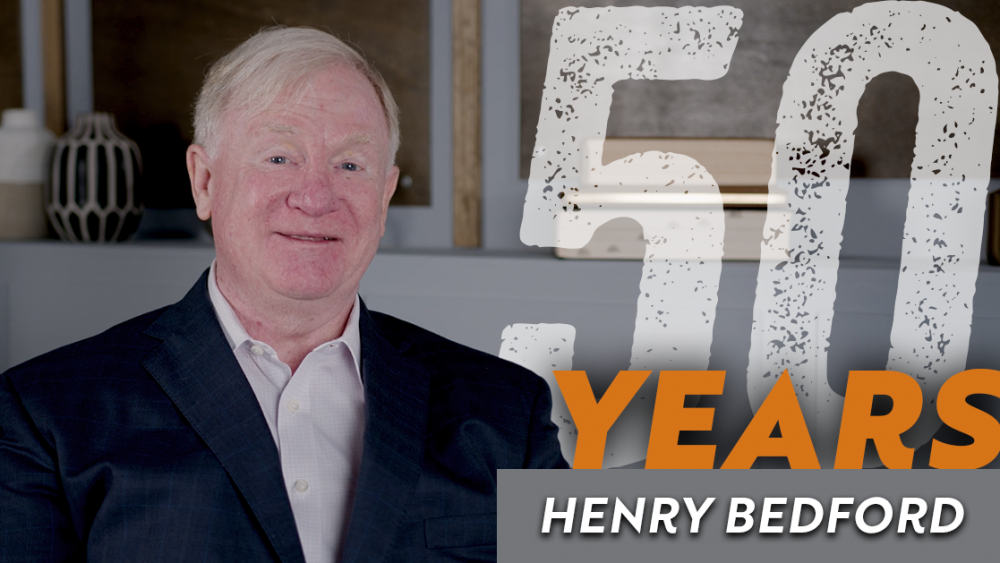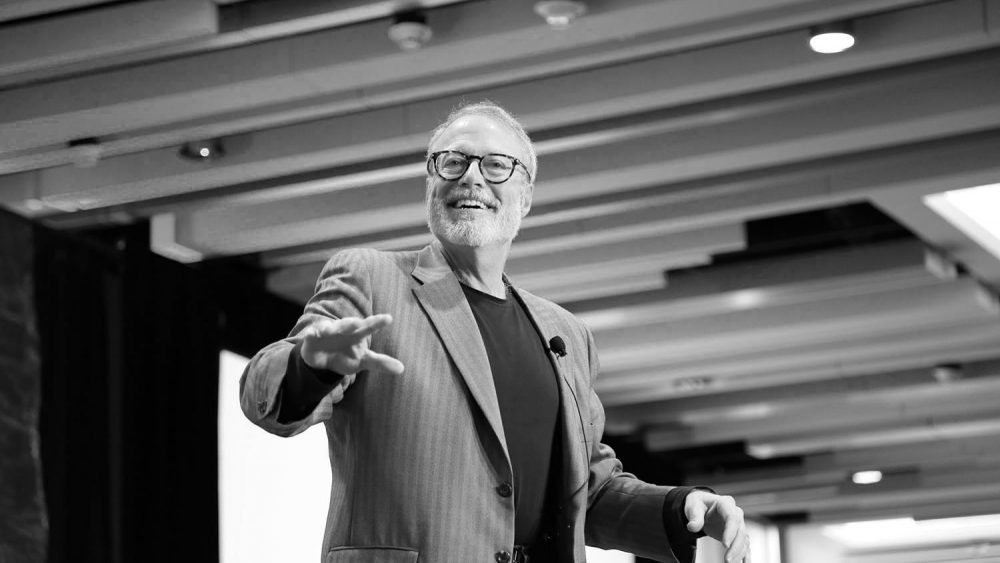A conversation that completely changed my life happened on the football field. I was playing football in high school, and my coach pulled me to the side and said, “Dustin, on that play right there, were you going 100%?” I said, “Coach Adams, you know, I probably wasn’t going 100%, but the play was away from me. I was over here, the play was over there, so I was conserving my energy because maybe the next play will come towards me and I’ll have more energy.” Then my coach looked me right in the eyes and said, “Dustin, I promise you, if you do not hold back and you give it 100% every single play, not only will you have more energy for all of the rest of the plays, you’ll make plays that you didn’t even think were possible.” And man, was he right.
I ended up getting a college scholarship to play at a small Division 2 school out in Missouri, and if you looked at my highlight reel that helped me get that scholarship, it was full of plays where the play wasn’t even close to me. It was on the other side of the field, and I was running and giving it 100%, hurdling people and making the tackle right before they were about to score. Going 100% made all the difference.
Think about your life, and think about what you do every single day. Have you formed the habit of going all in? Do you give it 100% every day? Do you give 100% in every conversation? Or do you mentally check out? Do you conserve that energy? Do you think, “You know what, that’s not really a play for me, it’s going over in that direction, so I’m going to focus on what I’m doing and I’m not giving it 100%?”
When you decide to go all in and give everything you’ve got at whatever it is you do, it makes all the difference.
A by-product of going all in is it helps you master the art of not thinking. We’re in a world full of overthinkers, and we’re in a world where people procrastinate. They think about what they need to think about instead of just doing it. There is a time and a place to be thinking. There’s a time to have a strategy and to be strategic about what you’re spending your time doing, but when the lights are on and it’s showtime, you have to be all in 100%, giving it everything you’ve got.
There are three steps to going all in:
Step #1 is knowing your priorities.
It’s amazing how people can drift through life and not know what their priorities are. When you really do deep work, build that foundation of the vision of your life and ask questions like, “Who am I? What kind of person do I want to be? What are the things I want to do? What is it I want to have?”, you’ll find the essence of your beliefs and why you’re even on Earth.
Then you can have priorities and say, “Here’s what’s important to me, here’s what’s not important to me.” That creates decisiveness. The people who are the true leaders of the world are the ones who are the most decisive. They know how to say yes, they know how to say no, and they know how to eliminate the word “maybe.” So, if you can live the rest of your life with no more “maybe’s,” I promise you it will be a more fulfilling and joy-filled life of knowing what you want and setting those priorities.
Step #2 is, after setting your priorities, making a commitment.
Again, so many people are like a boat just floating through the water without a rudder. When you know how to make a commitment, that’s when the sails are set, the wind is blowing and you’re heading the course of what you’ve committed to. Commitment can be a fear. There are many, many people in this world who are afraid of commitment. If that’s you, I highly recommend looking in the mirror and figuring out what things you know you should be doing. Maybe make a list and write down, “Here are all the things I know I should be doing.”
Your list might include reading a book you know you should be reading, or maybe it involves health and some initiative, whether it’s eating healthier, drinking more water or working out. Maybe it’s just recruiting a certain person. Maybe it’s making a hard decision and letting someone go. Maybe it’s something in your personal life, such as having a conversation with somebody who’s offended you.
Here’s the key to commitment: Take everything you know you should be doing, cross out the word “should,” and replace it with “must.” When your “Should Do’s” become “Must Do’s” and you commit to action, it changes everything. When you must do something, you do it. You commit to it. Things that are probably on your “Must Do” list naturally are things like eating and breathing, making sure that your family is safe, and making sure you are safe. Those are things you must do. Eliminate the word “should” from your vocabulary, and replace it with the word “must.” That will improve your commitment.
Commitment is freeing. Knowing what your priorities are and then committing to decisions and actions to get there is a liberating experience. It provides focus, it provides clarity, and it eliminates confusion—and the people who are the most committed have the most fun.
Step #3 is eliminating all excuses.
See, it’s interesting. Everybody has an excuse. You have an excuse, I have an excuse, and everybody walking around you has an excuse. The world is full of excuses. And guess what? People love hearing about your excuse. Misery loves company. So, tell me why you can’t hit your goal. Tell me why you didn’t do what you said you were going to do. Whatever that excuse is, it’s juicy. It sounds good. It feels good. It makes you feel good about all the things that you’re not doing. The world just loves putting excuses on like a warm blanket.
It’s like Spencer Hays taught us for the 60-plus years that he was at Southwestern, where he ended up becoming the majority shareholder. He was the executive chairman of the board for many years, and what he drilled into all of us over those years was that everybody has an excuse, but it’s the rare individual who will find a way over, under, around, or right through any obstacle in their way.
Anybody out of our 200,000 alumni who has sold books door to door would tell you that one of the key principles of the Southwestern Family of Companies, and what we’ve been doing for over 160 years, is finding a way and getting through the excuse. Now, if you’re sitting there saying, “Okay, how do I do it? You’re right Dustin, I have lots of excuses for why I can’t break through. I’m not going all in, and I have all these excuses and fears holding me back from giving it 100%.”
Here’s a technique that you can apply that will change your life. The technique is an acronym called “R.A.F.T.” Imagine you’re drifting through life. You’re on a raft, and you can either choose to be a raft navigator or allow the raft to drift through the current and take you wherever it goes.
So, here’s how you become a R.A.F.T. Navigator:
Step #1 of R.A.F.T. is you need to Realize an excuse is happening.
Identify the excuse. Pull out a piece of paper and write down, “Here are the things that I know I should be doing, and here are the excuses I’m giving myself for why I’m not doing them.” There’s power in labeling your excuse, whether it’s a fear of failure, fear of success, or just somebody in your life giving you internal pressure, shame, or guilt. Whatever the excuse might be, put it down on paper and say, “Here’s what my excuse is.”
Step #2 is to Accept that the current situation is what it is.
Maybe you have some kind of handicap, or maybe you have some kind of disadvantage and were born into a situation that wasn’t the most pleasant. Life gave you a bunch of lemons.
Accepting that you have a bag full of lemons is critical to breaking through and not making excuses. Whatever the excuse is, you need to understand it. We’ve worked with many, many people and tough, real situations through the years. As Rocky Balboa says, “Life is not full of sunshine and rainbows, and what really matters is not how hard you can get hit, but how many times you get back up.” That’s what accepting your situation is all about. We’re talking real stuff, whether it’s death, divorce, or disease. If you were to pay money and go to a counselor, that’s what they’re helping you realize: Even though it’s a tough situation, accepting it is key to moving to the next step.
Step #3 is to Focus on the controllables.
So many times, we want to focus on the things we can’t control. We can’t control the economy, we can’t control what other people say about us, we can’t control so many things, but that’s what we want to talk about and think about. When it comes down to it, there are three things that we can control every day that nobody can take away from you.
The first thing is your attitude. You’re in control of your attitude and it’s so inspiring meeting people who have been through hard circumstances, gotten out of those circumstances, have chosen not to be bitter, and have chosen to have a good attitude.
The second thing is your schedule. You’re in control of your schedule. What time do you go to bed? What time do you wake up? What are you doing with your time during the day? Most of the time, most of the days, you’re in control of your schedule. If you don’t like how your time is being treated, it’s your fault. We create boundaries with our time all the time.
Then the third thing that you can control is your activity. What are you doing with your activity? Are you working out when you’re supposed to work out? Are you reading the books you’re supposed to be reading? Are you making the phone calls you’re supposed to make? Are you doing the income producing activities you’re supposed to be doing? All of that is up to you. Nobody can force you to do an activity; you must choose to do an activity. What’s amazing is that when you focus on those three things, you’ll find freedom and have fun.
What ends up happening is the last step of R.A.F.T.: You Transform that negative event into positive momentum.
In other words, the excuse that was going to cause you to not succeed becomes the reason why you succeed. I think of our partners out in Europe. At Southwestern Family of Companies, we have 10,000 people in Europe who have sold books at Southwestern Advantage. For years, we had an excuse that we didn’t have any businesses in Eastern Europe and that there weren’t other opportunities for the Eastern European people. So, we followed the R.A.F.T. methodology and it made a huge difference. We Realized that we were making an excuse that we just didn’t have businesses over there. We had to Accept the situation and the reality of looking around and saying, “Yep, there are no other businesses for these awesome, hard-working people to have once they’re done with their cultural exchange work in the U.S.”
After the cultural exchange program, we needed to Focus on the controllables. We actually started focusing on our attitude first and then on our self-talk, saying, “We can create businesses in Estonia, Latvia, Lithuania, Bulgaria, Poland…these are countries we can expand to.”
We then started focusing on our schedule. We started booking flights to fly over there, meet with our teams, and figure out what business opportunities were there. This activity led to an important result: We Transformed that excuse into so much positive momentum that, as of today, we have six thriving businesses in Eastern Europe. We also created an entity called E1 Ventures, which is a business incubator. What was once an excuse has become a strength, and we’re now starting one or two businesses every year moving forward.
So, think about what it means to be all in, what it means to know what your priorities are, and what it means to truly commit to a goal, to a vision, to a mission. Then, eliminate the excuses and decide, “This is something I’m willing to do. I’m all in, and I’m going to stop overthinking. I’m going to go 100%.” It will transform your life, and it will make a difference. And, at the end of the day, it will give you more energy, better results, and a better life.




